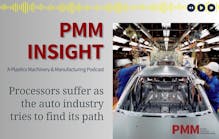Read more on the labor crunch: https://plasticsmachinerymanufacturing.com/21248002/.
By Karen Hanna
You can’t put a price on kindness or respect.
That’s the message from some plant managers and consultants as employers grapple with unprecedented challenges finding workers. For them — and, they say, for their own workers — there is more to the bottom line than just pay.
“I’m here every day to set a culture and make sure that people are happy, and that they’re fulfilled. And just make it a great place to work, making sure that we do that,” said Michael Sinclair, co-owner of Elevate Solutions Group, a supplier of trays used by eye doctors to store contact lenses. “Get to know each person, let them know that they’re important, that they’re valued, that their work is important, let them know what’s expected of them.”
Located in bustling Atlanta, the company recently opened an injection molding facility, and it has hired about two-thirds of its overall 60-person workforce in the past year.
Sinclair acknowledged that the company benefits from its location in a diverse and growing metropolitan area, but he doesn’t feel an urgency to engage in the pay-hike wars that have broken out among some employers scrambling for entry-level workers. As a devout Christian, he sees management differently: “It’s a ministry, it’s a calling.”
With that mission in mind, he bought T-shirts for his employees to celebrate the Braves’ World Series run. He has tried to mentor young employees on how to approach work; he granted one woman two days off when he learned her college-age son would be visiting from out of town. And when he discovered his employees were fascinated by his company’s forklift trucks, he offered training.
“We’ve probably trained 20 people to drive forklifts here, because they never drove one. They thought it was really cool,” he said. “And so like, half the company now is forklift-certified,” he said.
Rethinking company culture
According to the U.S. Bureau of Labor Statistics, manufacturing salaries and wages in September were 3.7 percent higher than the same period last year.
While pay might attract job seekers to a company, management and company culture could be the deciding factors in whether they will stay, said automation consultant Will Healy III, a marketing manager for the Americas at industrial automation supplier Balluff. For companies struggling to land and keep workers, the solutions could require deeper introspection.
“People want to work. People quit managers, as the saying goes, so if you’re having trouble retaining people, what kind of leadership program are you running?” Healy said.
It’s an important question, especially for those on the line.
One worker at a major appliance manufacturer said he’s heard all the promises about cultivating a supportive and nurturing work culture. With more than 20 years of manufacturing experience — and a decade of plastics processing experience — he knows sometimes they’re sincere, but often not.
Instead, he said he worries about safety and musculoskeletal issues, citing injuries he said he and others have suffered at work. He is also aggravated by his plant’s two-tiered pay structure, OK’d by union members in 2005 at the urging of management. The structure creates one set of wages for longtime workers and another, much lower scale for newcomers. It still foments resentment, he said.
“All future hires now come in at this extremely low wage; however, the environment has now changed, which has led other employers to raise their wages, and we’re still kind of lagging behind on that,” said the employee, who asked not to be named.
The employee — who has worked as a press operator — took on an apprenticeship to gain new skills and, eventually, score a bigger salary. The 48-year-old said it is the best experience he has had.
“All of that learning, someday I’m going to retire and I’m going to take so many skills, and I’m going to use them at a garage or shop of my own discretion on my own projects and hobbies, and I want to expand those skills, and if I can use them to do that, I want to,” he said.
It's not just about money
Companies that find ways to offer their workers both mental and financial rewards can succeed in the competition for talent, said Nicholas Wyman, the president of the Institute for Workplace Skills & Innovation (IWSI), which helps manufacturers develop apprenticeships.
Wyman said he believes that, compared to other countries, the U.S. has neglected workforce development in recent years.
Simply raising pay won’t address the plastics industry’s talent-pipeline problems.
“Offering financial inducements or competing on wages alone is a zero-sum game. Employees motivated by money alone are likely to jump for a better offer, and employers reluctant to hire new people in case of losing them will always be playing catch-up,” he said.
Maureen Steinwall, the CEO/CFO of custom injection molder Steinwall Inc., is writing a book on management. She believes in a humanistic approach that emphasizes kindness, communication and a willingness to teach.
The approach puts the onus on managers for answering four questions for employees: What am I to do? Why do you need me to do it? How do you define success? How am I doing?
“I’ve always said that anybody can buy an injection molding machine, and anybody can buy the resin, but what’s uniquely different, what differentiates you from everybody, is the human element and how they respond and how they service the customer and how they think creatively,” Steinwall said.
Established in Minneapolis by Steinwall’s father, Steinwall Inc. has about 155 employees.
As Steinwall sees it, the company is bound to provide them with a panoply of benefits. The basics are obvious: pay, health insurance and a safe, clean working environment. Take away the basics, and employees would be dissatisfied, but it is the add-ons that create loyalty.
“And that’s creating a sense of community, that’s helping with development [of new skills], that’s treating people with respect,” Steinwall said.
Employees need clear direction, patience and constructive feedback that recognizes, as Steinwall says, that even Tiger Woods needed time to develop a perfect swing.
“What I tell people here at Steinwall is any time there’s a mistake: Well, first of all, humans, each human being on average makes one mistake a day. So, we know that ... that we have 155 people, we’re going to make 155 mistakes today, how are we going to design our organization such that we catch these mistakes before they impact our customer, before they impact our bottom line?”
Fixing problems, not blame
When problems arise, humanistic management puts the blame on the process, rather than a person. Maybe the training was faulty, or perhaps the hiring process failed to reflect the needs of the position.
Whatever the case, Steinwall said, the company needs to assess its system of checks and balances.
She said workplaces with traditional management approaches can be bastions for bullies. Given a chance, people will leave, damaging the company’s reputation.
Gimmicks and incentives can’t compensate for the damage of bad managers, Steinwall said.
The appliance-plant worker agreed.
Asked whether he’s seen benefits from working at a time when labor is in short supply, he was quick to respond: “No.”
Given the two-tiered pay structure, new workers don’t stay long, he said.
“Our HR was wanting to bring refreshments in for the summer to help with retention. That’s pretty sorry, in my opinion,” the former press operator said.
Employees value authenticity, Steinwall said.
“If you got a bouquet of flowers on a Tuesday, you would be very appreciative. But if you get a bouquet of flowers on Valentine’s Day, it’s an expectation, and it doesn’t have the same feeling around it. And so that transfers to management also; you can’t throw these gimmicks out there and think they’re going to do anything but become an entitlement,” she said. “And then you try to take it away, and you are going to have hell to pay.”
Do unto others …
For Simplay3’s Marshall Murdough, a simple rule still applies: “Whatever it was, in whatever capacity [employees are] working, whether it’s assembling a product, putting a hardware pack in a carton, trimming a product or working right off the machines, it’s just a Golden Rule. Do unto others as you’d have done to you,” said Murdough, who heads up Simplay3 Co.’s e-commerce business.
Murdough said the rotomolding company provides its nearly 100 employees with bonuses and incentives, but he attributed employee loyalty to the “Do It Right” philosophy established by his father, company founder and CEO Tom Murdough.
Whatever the task, employees are empowered to find a way to make a product in which they can take pride.
Even at a time when many workers are jumping ship, employees who feel valued will stay at a company that treats them well, Wyman and the plant managers said.
“For people to want to stay with you long-term, they have to not only enjoy the work, but understand and see their future in the industry,” Wyman said.
Karen Hanna, senior staff reporter
Contact:
Balluff Inc., Florence, Ky, 800-543-8390, www.balluff.com
IWSI, Lexington, Ky. www.iwsiamerica.org, info@iwsiamerica.org






